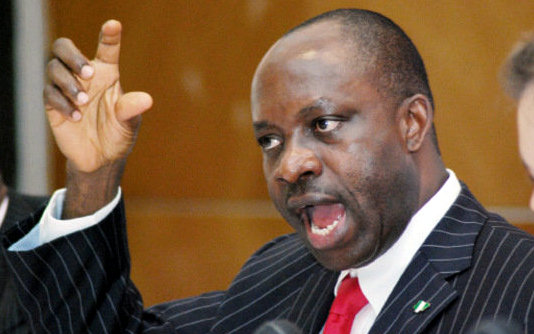Former Central Bank of Nigeria governor, Chukwuma Soludo, has again spoken on the current state of the Nigerian economy.
In his assessment on Friday, the economics Professor said the Gross Domestic Product, GDP, size had dropped by half in dollar terms in less than two years of the present administration.
From about $575 billion in May 2015, Mr. Soludo said the size of Nigeria’s GDP dropped to between $354 and $232, with the country again losing the first and second positions in Africa’s GDP ranking.
At the interbank rate of about N375 per dollar, he said the GDP was about $288 billion, while at the parallel market rate of about N465, the figure was closer to $357 billion.
Mr. Soludo said the country’s economy was not only in a recession in domestic currency terms, but has suffered “massive compression” in dollar terms.
The professor of Economics, who was the lead discussant at a Vanguard Newspapers event titled, “The Hard Facts to Rescue the Nigerian Economy”, said although the Buhari administration inherited a bad economy, it has only won selected micro economics battles, while losing the war on the macro economy.
He said the previous administration undertook an unprecedented rate of debt accumulation at a time of unprecedented oil boom.
While acknowledging the efforts of the present administration in fighting insurgency and corruption, he criticised the implementation of the Treasury Single account (TSA), which he said could have been done without squeezing the economy of needed liquidity at a time of recession.
He said the payroll audit, which discovered thousands of “ghost workers” and some “command and control measures”, demand management and exchange rate controls, impacted business confidence and private investment, massive capital flight, and drove the economy into recession.
“Most macro variables have worsened significantly: inflation (from 9% to 19%); exchange rate (from 197/215 to 305/465); unemployment (from 7.5% to 14%); GDP growth (from 2% to -1.56%); market capitalization of NSE (from N11.658 trillion, or $54.2 billion at parallel market rate, to N8.658 trillion, or $18.6 billion at parallel market rate— with daily trading down from around N11 billion to N1 billion, or less, while poverty was escalating, and youth agitations increasing,” he said.
Besides, he said business confidence remained very low at (-29), while competitiveness index was at a low 3.39 points, ranked 124th in the world.
Foreign reserves, Mr. Soludo noted, remained depleted and the current account balance remained negative, while savings investment rates were very low and the Sovereign credit ratings worsened.
“Nigerian workers have suffered a double whammy: average nominal wages are declining, while real wages dramatically shrunk (with high inflationary pressures). Asset prices have collapsed, and household wealth has shrunk. Paradoxically, Nigeria’s rank on the Corruption perceptions index remained unchanged at 136th position out of about 176 countries.
While Nigeria’s ranking on the Fragile States index worsened from the 17th and 14th positions in 2014 and 2015 respectively to the 13th position in 2016 (down from 54th position in 2005), Mr. Soludo said the overall direction of macroeconomic policy was largely more of the same.
On fiscal policy, he said the federal government has continued to spend over 100 per cent of its revenue on recurrent expenditure, while borrowing all its capital expenditure, with a halfhearted commitment to deregulation of petroleum pricing as well as privatization of refineries.
On the unveiling of the Economic Recovery and Growth Plan, he commended the government, saying ownership of the plan would determine whether it was implementable or a mere public relations document.
“Where is the new structure of the country that will deliver the new Plan? Where are the best practices of federalism that will eliminate the paralysis of the centre— and alter the incentive system and drive competition in a post oil world? How will you transit to the post oil economy when the Plan is designed to intensify dependence on it and other primary commodities — agriculture and solid minerals?” he asked.

